Wgu c961 laws - Study guides, Class notes & Summaries
Looking for the best study guides, study notes and summaries about Wgu c961 laws? On this page you'll find 57 study documents about Wgu c961 laws.
Page 4 out of 57 results
Sort by
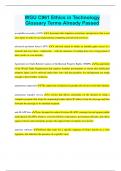
-
WGU C961 Ethics in Technology Glossary Terms Already Passed
- Exam (elaborations) • 22 pages • 2024
-
- $6.49
- + learn more
WGU C961 Ethics in Technology Glossary Terms Already Passed acceptable use policy (AUP) A document that stipulates restrictions and practices that a user must agree in order to use organizational computing and network resources. advanced persistent threat (APT) A network attack in which an intruder gains access to a network and stays there—undetected— with the intention of stealing data over a long period of time (weeks or even months). Agreement on Trade-Related Aspects of Intellectu...
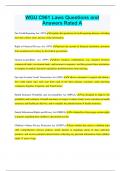
-
WGU C961 Laws Questions and Answers
- Exam (elaborations) • 7 pages • 2024
-
- $8.49
- + learn more
Fair Credit Reporting Act (1970) regulates the operations of credit reporting bureaus, including how they collect, store, and use credit information. Right to Financial Privacy Act (1978) protects the records of financial institution customers from unauthorized scrutiny by the federal government Gramm-Leach-Bliley Act (1999) allows business combinations (e.g. mergers) between commercial banks, investment banks, and insurance companies, and thus permits these institutions to compete in mark...
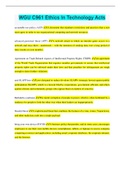
-
WGU C961 Ethics In Technology Acts
- Exam (elaborations) • 7 pages • 2022
- Available in package deal
-
- $6.39
- + learn more
WGU C961 Ethics In Technology Acts acceptable use policy (AUP) A document that stipulates restrictions and practices that a user must agree in order to use organizational computing and network resources. advanced persistent threat (APT) A network attack in which an intruder gains access to a network and stays there—undetected— with the intention of stealing data over a long period of time (weeks or even months). Agreement on Trade-Related Aspects of Intellectual Property Rights (TRIPS)...
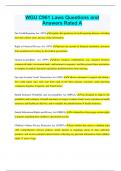
-
WGU C961 Laws Questions and Answers Rated A
- Exam (elaborations) • 7 pages • 2024
-
- $11.99
- + learn more
Fair Credit Reporting Act (1970) regulates the operations of credit reporting bureaus, including how they collect, store, and use credit information. Right to Financial Privacy Act (1978) protects the records of financial institution customers from unauthorized scrutiny by the federal government Gramm-Leach-Bliley Act (1999) allows business combinations (e.g. mergers) between commercial banks, investment banks, and insurance companies, and thus permits these institutions to compete in mark...
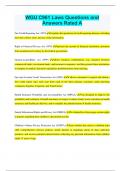
-
WGU C961 Laws Questions and Answers Rated A
- Exam (elaborations) • 7 pages • 2024
-
- $11.49
- + learn more
Fair Credit Reporting Act (1970) regulates the operations of credit reporting bureaus, including how they collect, store, and use credit information. Right to Financial Privacy Act (1978) protects the records of financial institution customers from unauthorized scrutiny by the federal government Gramm-Leach-Bliley Act (1999) allows business combinations (e.g. mergers) between commercial banks, investment banks, and insurance companies, and thus permits these institutions to compete in mark...
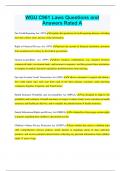
-
WGU C961 Laws Questions and Answers Rated A
- Exam (elaborations) • 7 pages • 2024
-
- $11.49
- + learn more
Fair Credit Reporting Act (1970) regulates the operations of credit reporting bureaus, including how they collect, store, and use credit information. Right to Financial Privacy Act (1978) protects the records of financial institution customers from unauthorized scrutiny by the federal government Gramm-Leach-Bliley Act (1999) allows business combinations (e.g. mergers) between commercial banks, investment banks, and insurance companies, and thus permits these institutions to compete in mark...
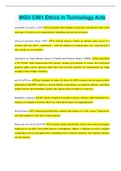
-
WGU C961 Ethics In Technology Acts
- Exam (elaborations) • 7 pages • 2022
- Available in package deal
-
- $7.99
- + learn more
WGU C961 Ethics In Technology Acts acceptable use policy (AUP) A document that stipulates restrictions and practices that a user must agree in order to use organizational computing and network resources. advanced persistent threat (APT) A network attack in which an intruder gains access to a network and stays there—undetected— with the intention of stealing data over a long period of time (weeks or even months). Agreement on Trade-Related Aspects of Intellectual Property Rights (TRIPS) An ...
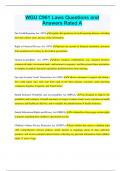
-
WGU C961 Laws Questions and Answers Rated A
- Exam (elaborations) • 7 pages • 2023
-
- $10.49
- + learn more
Fair Credit Reporting Act (1970) regulates the operations of credit reporting bureaus, including how they collect, store, and use credit information. Right to Financial Privacy Act (1978) protects the records of financial institution customers from unauthorized scrutiny by the federal government Gramm-Leach-Bliley Act (1999) allows business combinations (e.g. mergers) between commercial banks, investment banks, and insurance companies, and thus permits these institutions to compete in mark...
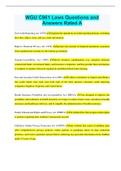
-
WGU C961 Laws Questions and Answers Rated A
- Exam (elaborations) • 7 pages • 2023
-
- $8.49
- + learn more
WGU C961 Laws Questions and Answers Rated A Fair Credit Reporting Act (1970) regulates the operations of credit reporting bureaus, including how they collect, store, and use credit information. Right to Financial Privacy Act (1978) protects the records of financial institution customers from unauthorized scrutiny by the federal government Gramm-Leach-Bliley Act (1999) allows business combinations (e.g. mergers) between commercial banks, investment banks, and insurance companies, and thus permi...
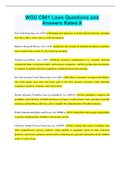
-
WGU C961 Laws Questions and Answers Rated A
- Exam (elaborations) • 7 pages • 2023
-
- $8.49
- + learn more
WGU C961 Laws Questions and Answers Rated A Fair Credit Reporting Act (1970) regulates the operations of credit reporting bureaus, including how they collect, store, and use credit information. Right to Financial Privacy Act (1978) protects the records of financial institution customers from unauthorized scrutiny by the federal government Gramm-Leach-Bliley Act (1999) allows business combinations (e.g. mergers) between commercial banks, investment banks, and insurance companies, and thus permi...

Study stress? For sellers on Stuvia, these are actually golden times. KA-CHING! Earn from your study resources too and start uploading now. Discover all about earning on Stuvia


